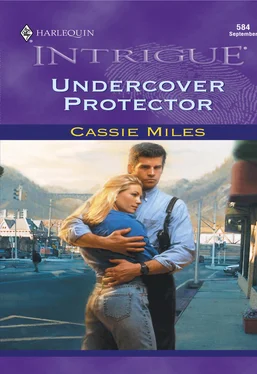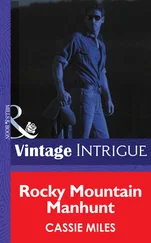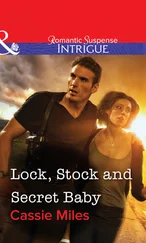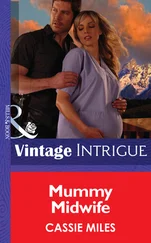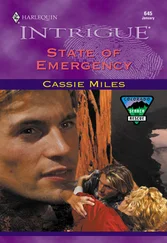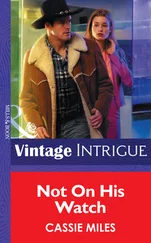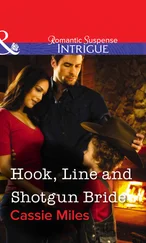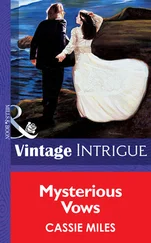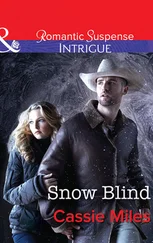Muttering to herself, she slammed the trunk and turned.
A dark solid form loomed in front of her. The rain splattered on his black poncho and dripped off the bill of his baseball cap. The streetlights outlined his powerful shoulders. He was at least as tall as Annie, and her height in shoes was six feet.
When he took a step in her direction, her instincts warned her that his intentions might not be friendly. She would’ve felt a whole lot safer if she could reach her gun, but the shopping bag was in the way and her piece was holstered. Warning herself not to overreact, she asked, “Can I help you?”
“You’re late tonight, Annie.” He knew her. He’d been waiting for her. His ominous whisper confirmed her sense of danger. “Very late.”
His arm raised. He’d been hiding a baseball bat under the poncho. He gripped the handle with both hands as if he was stepping up to the plate. “This is nothing personal.”
Her self-defense training at the police academy should have prepared her to face him, but she’d been caught unawares. She’d never expected to be accosted in her own parking lot. That kind of thing happened to other women. Annie wasn’t a victim. She was a cop. “Hey!” she shouted at him. “Back off!”
The tip of his bat quivered. He lifted his chin and she saw the face under the cap. His features were distorted by a nylon stocking pulled over his head.
He took a swing. She dodged. The bat slammed against the left rear fender of her car with a sharp metallic crunch.
She dropped the sack. Plastic bottles of shampoo, conditioner and lotion bounced and scattered across the asphalt. Annie went for her gun.
Before she could aim, the assailant struck again. His bat connected with her right forearm. Pain flashed through her like the strike of a lightning bolt. She dropped the Glock automatic and protectively pulled her injured arm close to her torso. This shouldn’t be happening. She was supposed to be prepared for anything.
Again he raised the bat and she whirled away from him. She wanted to fight back, but she couldn’t get close enough to grapple with him. She was injured, unarmed, helpless. Her only defense was to run. She hurled herself into the downpour.
The hardwood bat swished past her shoulder, missing her by centimeters.
She looked back and saw him take another one-handed swat.
The bat struck a glancing blow to her skull and at the same time she heard a shout. “What’s going on over there?”
“Help me!” Her scream intensified the pain inside her head. Oh God, it hurt. She couldn’t think. Her brain was numb. The lights in the parking lot blurred in the rain, the endless rain. Stunned, she dropped to her knees.
The assailant was right on top of her, but he didn’t touch her again. He was running, fleeing the scene.
The cop in her wanted to apprehend him, but she couldn’t move. She fell forward onto the wet asphalt. A chill sank into her body. The rain tugged like damp tendrils of seaweed in an undertow, pulling her down into a fathomless dark.
Almost unconscious, she felt someone holding her, cradling her. “It’s okay,” he said. “I’ve got a cell phone. I called an ambulance.”
There was something reassuring and familiar about his voice. She wanted to look up and see the face of her rescuer, but her eyelids wouldn’t open.
Gently he murmured, “You’re going to be all right.”
The night washed over her in dark waves. She had to be all right. If she died, who would take care of her grandpa?
“G’night,” she said. And sank into unconsciousness.
“I know you. You’re Lionel Callahan’s granddaughter.” The checkout clerk at the Bridgeport Mini-Mart peeped over her half glasses. “It’s Annie, right?”
“That’s right.” Though she recognized the round face and tiny pug nose of the gray-haired woman, Annie had to read the name tag pinned above the breast pocket of the orange smock. “Edna.”
“So, Annie. How long have you been back in town?”
“A couple of days.”
“What did you do to your arm?”
Annie glanced down at the adjustable cast. She’d been lucky to escape from the parking-lot assault with only a hairline fracture and a mild concussion. The bruising was worse than the break.
“It’s nothing,” she said. News traveled quickly in a small town like Bridgeport, and Annie preferred not to spread this story. It was more than a little embarrassing for a cop to get mugged. “Could you sack my groceries in this canvas pouch? Then I can carry the handle over my left arm.”
“Sure thing,” Edna said. “And how’s Lionel doing?”
“As well as can be expected after a stroke.”
She wasn’t happy with her grandpa’s progress. Though he seemed to be resting comfortably, his attitude bordered on depression. He wouldn’t talk on the telephone, wouldn’t get out of bed and refused to see visitors because he didn’t want people to see him at less than one hundred percent.
Her grandpa had always been an important man in this town. He was the former high-school football coach, and he’d served for two decades as the municipal judge—an elected part-time position for handling minor violations, like breaking curfew or failure to pay parking tickets. Everybody in Bridgeport respected Lionel Callahan, and he didn’t want his status to change.
“Poor Lionel,” Edna said as she slipped a bag of Hershey’s Kisses into the pouch. “I’ll drop by tomorrow with some of my special homemade chicken soup.”
“That’s not really necessary,” Annie said. The freezer was already crammed full of casseroles from friends and well-wishers. They had enough frozen pasta to feed Italy.
“Tell me, Annie.” Edna’s button nose twitched, sniffing out fresh gossip. “Are you married yet?”
“Not yet.” Annie forced a smile.
“A career woman, huh? I heard you were a policewoman. Ever kill anybody?”
“No.” Other people seemed to think her life was one big action-adventure movie.
“But I’ll bet you’ve shot somebody.”
“No again.” Annie shoved a loaf of bread on top of her other groceries, slung the canvas pouch over her shoulder and headed for the door. “See you around, Edna.”
At the corner she turned. It was four blocks from the mini-mart back to her grandpa’s house on Myrtlewood Lane.
Had she ever killed anybody? What a question! Her job was mostly paperwork and common sense. She seldom unholstered her gun and had never purposefully intended to shoot another human being—with the notable exception of the man who’d assaulted her in the parking lot four days ago. If she’d reached her gun in time, she would have fired. That incident, however, was more about self-preservation than policework. Or was it?
For a couple of weeks she’d been on the receiving end of some very strange harassment. Some unknown person had been leaving cheap porcelain figurines where she’d be sure to find them. It started with a skunk on her desk at work. Then there was a ballet dancer on the hood of her car. In the hall outside her apartment she’d found a chipmunk with a chipped ear.
These odd gifts, unaccompanied by a note or any type of explanation, didn’t make sense. At the time she hadn’t thought they were meant as threats.
She rounded the corner onto Myrtlewood Lane, enjoying the comfort of wearing khaki walking shorts and a red T-shirt, instead of a police uniform with a utility belt that weighed thirteen pounds. Her long straight blond hair was free from the regulation ponytail or bun that went with her uniform. In spite of the slight residual headache from her concussion, she felt good.
Here at home, the air always smelled fresher. The red-and-gold sky before dusk shone with more brilliance. Her ears resonated with normally unheard sounds, like the whirr of a hummingbird’s wings.
Читать дальше
